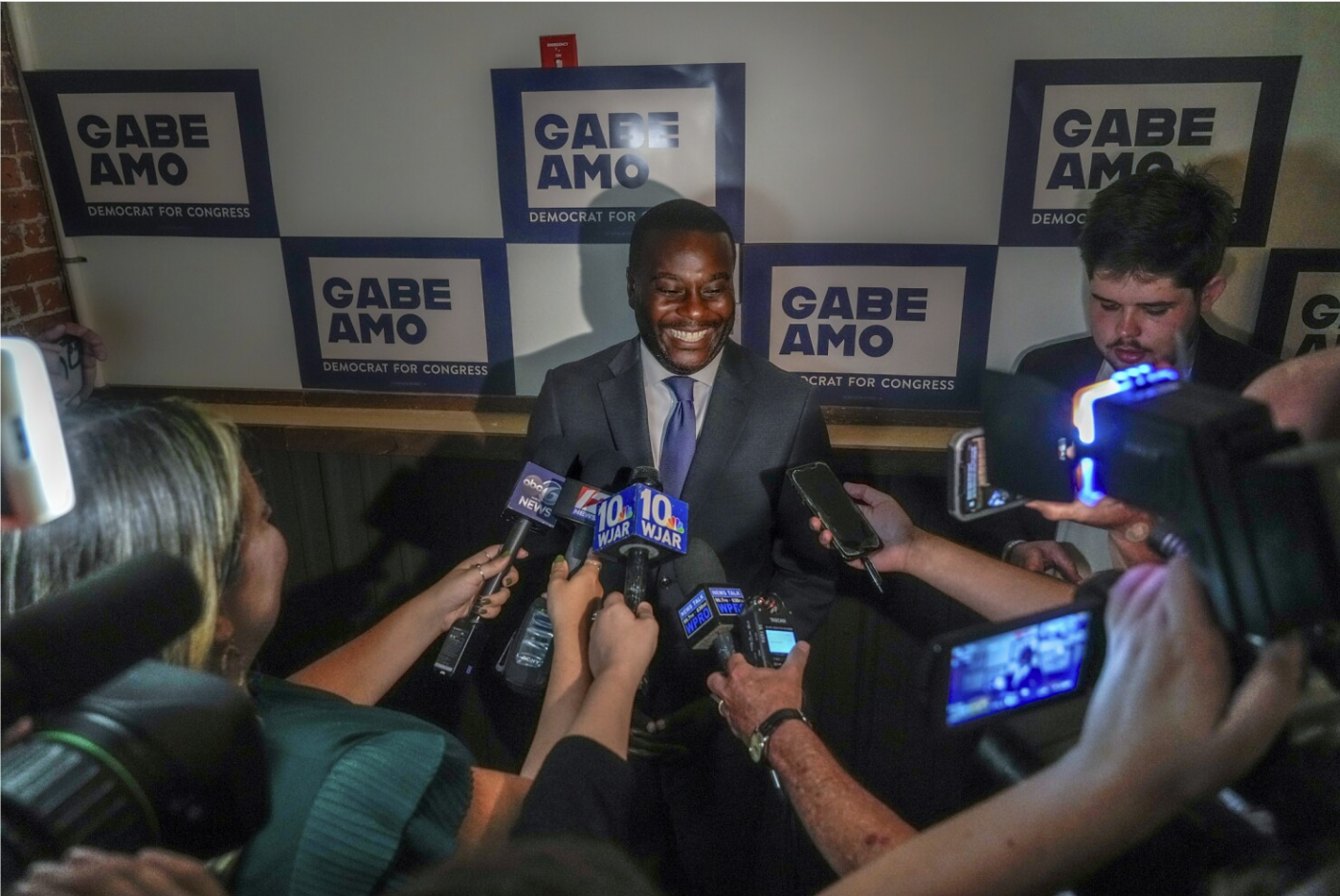The dust has settled following the Democratic primary for Rhode Island’s 1st House District seat vacated by former Representative David Cicilline ’83, and Gabe Amo has emerged victorious. In a crowded primary that, at its peak, featured over 13 candidates, Amo leaned on his Rhode Island roots and professional experience to win with about one-third of the vote. Amo’s victory, while already noteworthy for its underdog nature, also provides a blueprint to the Democratic candidate of the future: a diverse candidate who, through compromise and opportunism, is able to satisfy more than one slice of the Democratic electorate.
Amo’s win is an important milestone for Rhode Island: Assuming he wins the general election (which is not expected to be competitive), he will be the first person of color to represent the state in Congress. However, Amo did not make representation the cornerstone of his campaign, like some other candidates might have. Instead, he distinguished his candidacy by focusing on Social Security, Medicare, and his middle-of-the-road Democratic credentials from his time in the Obama administration. This decision was strategic given that the field featured many diverse candidates whose victory would have been every bit as historic as Amo’s.
Amo’s middle-of-the-roadness, as it were, might have been one of the deciding factors in his unexpected victory. To some extent, this primary was a proxy war between several factions of the Democratic Party, from bona-fide progressive choice Aaron Regunberg to Congressional Hispanic Caucus pick Lieutenant Governor Sabina Matos. Amo, for his part, was endorsed and supported by the Congressional Black Caucus, while Rhode Island State Senator Sandra Cano was backed by many local unions and labor organizations.
If the results of the primary are any indication of the influence of these organizations, this would bode poorly for both the Congressional Hispanic Caucus and local labor unions in Rhode Island: Matos and Cano finished third and fourth, respectively. The race’s real showdown was between Amo and Senator Bernie Sanders’ (I-VT) endorsee Regunberg. However, the race was not cut and dried by any means—the cycle was marred with scandal and featured the slow failure of the Matos campaign, which might have overshadowed policy preferences in the eyes of the electorate.
From the outset, it was clear that the race was Lieutenant Governor Matos’ to lose—and lose it, she did. As one of the most prominent statewide officials, it was widely expected that she would have a head start. However, enthusiasm for her campaign ultimately waned and she failed to keep up the momentum—all of which was exacerbated by the investigation and surrounding hullabaloo related to her gathering of election signatures.
For weeks, as the news on Matos circled around the potential forgery of constituent signatures necessary for her to make the ballot, her campaign flailed and her lead shrank. Despite the eventual exoneration of her campaign following an investigation, Matos’ position as the front-runner continued to slide (even in her campaign’s own polling) as centrist voters found their new champion in Amo.
Amo survived a scandal-filled race, though not without picking up a few marks of his own along the way. Although the circumstances were quite different, both Amo and Regunberg were criticized for their campaign funding and relationships to outside PACs. Amo was granted over $600,000 in out-of-state PAC funding through various Democratic organizations, which helped purchase advertisements, send mailers, and sponsor messaging (all of this was particularly significant in a primary that relied on name recognition among high-turnout voters). While Amo’s PAC funding is lamentable, this type of spending is becoming more and more common across all types of races, as the margins in Congress sit razor-thin and any one member can influence the legislature.
Regunberg, on the other hand, faced a different PAC funding scandal. Progress RI, a super PAC set up just for this primary race, was one of Regunberg’s largest sponsors (in addition to his father-in-law, who contributed $125,000 to the campaign). For a candidate supported by both the Congressional Progressive Caucus and the Working Families’ Party, the super PAC funding revelation was rather embarrassing, though by no means damning.
As the race drew to a close and Regunberg led even in Amo’s internal polling, other candidates turned their fire entirely on the progressive, which opened up the field just enough for Amo to charge—and charge Amo did. One advertisement, featuring former RI-1 Representative Patrick Kennedy, highlighted Amo’s ability to work for Rhode Islanders and his connection to the national Democratic Party. That ad might just have propelled Amo to the front of the pack.
Amo pulled off an unexpected victory and ran a good campaign, but Rhode Islanders still have much to ask of him. When he arrives in Congress after the November election, he will join freshman Representative Seth Magaziner in one of the smallest and most junior congressional delegations in the nation. Amo himself will be the second-most junior member of the House of Representatives. That challenge alone will surely keep him busy, not to mention the fact that he has to fill the vast shoes of former Representative Cicilline. Rhode Islanders should hope that he rises to the occasion sooner rather than later. As a small state with a small congressional delegation, Rhode Island’s representatives must punch above their weight. Whether or not Amo can build up the influence and track record to rival his predecessor remains to be seen, but his ambitious agenda certainly indicates a willingness to fight for Rhode Island.
